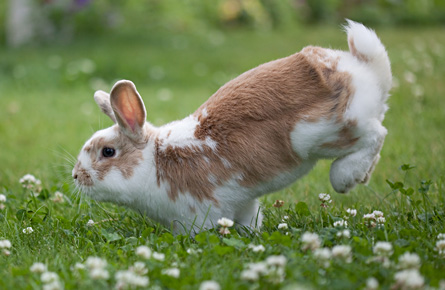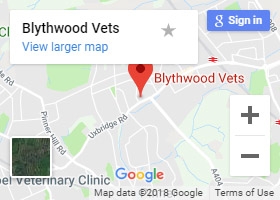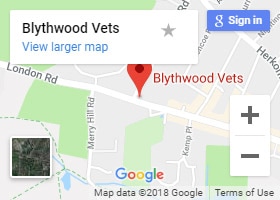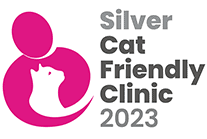Dog care and advice | Puppy Advice | Blythwood Vets
By getting your dog vaccinations from a puppy, you will be saving them from various preventable diseases. It is far better to prevent these illnesses than a treatment regimen that may not always work.
What diseases do dog vaccinations protect dogs against
Although you can decide to immunise against a various number of illnesses, these are the five most common diseases that we recommend vaccinating against:
- Kennel Cough (Infectious Tracheobronchitis)
- Parvovirus
- Leptospirosis
- Distemper
- Infectious Canine Hepatitis
Kennel Cough (Infectious Tracheobronchitis) - Infectious tracheobronchitis is like the canine equivalent of the human common cold. It is a respiratory tract infection that's easily transmitted from one dog to another. It results in a dry, hacking cough. So, if your dog's going to come into contact with other dogs, whether it's through the use of boarding kennels, or even through simply playing with other dogs in the park, we strongly recommend that you get your dog’s vaccinations.
Parvovirus - This highly resistant virus is spread through infected faeces and can remain in the environment for many months. Symptoms include high fever, listlessness, vomiting, and blood-stained diarrhoea. Vaccination is the only certain method of preventing this potentially fatal disease, which is most severe in young puppies and elderly dogs.
Leptospirosis - Dogs infected with this disease can suffer liver and kidney damage, and they will need a long course of treatment if they're to fully recover. This disease can also be passed on to humans!
Distemper - Distemper is spread through discharges from the nose and eyes of dogs. Symptoms can include listlessness, fever, coughing, diarrhoea, and vomiting. The canine distemper virus attacks many major organs - including the nervous system - and may cause permanent damage, even if your dog recovers.
Infectious Canine Hepatitis - Canine Hepatitis is transmitted among dogs by contact with secretions such as saliva, infected urine, and faeces, resulting in similar symptoms to those of canine distemper. If left untreated, canine hepatitis can result in liver failure, eye damage, and breathing problems, while the course of the disease can range from mild to fatal.
Dog Vaccinations FAQ
Is it important for dogs to get vaccinated?
Dog vaccinations are essential for providing your dog with adequate protection from life-threatening and intensely painful diseases. There is the option of Titre testing, which involves blood samples to determine your dogs immunity. Unfortunately, this is not always 100% reliable, it is costly to perform and leptospirosis would still need to be vaccinated against.We recommend all core vaccinations for this reason
Is it OK not to vaccinate my dog?
As veterinary professionals, we would always recommend vaccinations; when it comes to harmful diseases, the risks aren't worth taking.
I have heard that vaccines are risky and to avoid them – is that true?
Any veterinary procedure that is performed can carry some sort of risk, however, in the case of dog vaccinations, it is important to remember that for the majority of pets the benefits of being vaccinated greatly outweigh the risks. Vaccination reactions are rare and where they do occur, they are mostly short-term and mild. Reactions of this nature show that the vaccine is effectively stimulating the immune system. The team at Woodward Veterinary Practice are always happy to talk to you about the benefits and risks associated with vaccinating your dog to help identify the most suitable strategy as part of their wider preventative healthcare programme.
Is it a legal requirement to have my dog vaccinated?
It is not a legal requirement to have a dog vaccinated, but it is highly advisable. Kennels, dog trainers and day-care centers may require vaccinations from all dogs before they will accept them. Insurance can also be invalidated if dogs are not vaccinated.
Can I vaccinate my dog myself?
Under UK law, only veterinary surgeons can prescribe medications; vaccinations fall into this category. Your vet is required to health assess a pet before prescribing and administering the vaccine. Like many drugs, vaccines can have mild side effects, which is why a health check prior is essential to ensure your dog will be fit and well after the vaccine is administered. Veterinary professionals are trained at administering these vaccines;users should not administer this on their own. Also, it is important to ensure vaccination bottles, needles and syringes are disposed of correctly. There are diseases, such as diabetes, for which owners must inject their animals at home however, proper monitoring and training are essential.
Why does my dog need to have vaccinations every 12 months?
Depending on the disease that your dog is being vaccinated against, the period of time that they are protected will differ. Certain diseases, such as leptospirosis in dogs only carry around 12 months of protection, which is why a yearly booster is recommended. Even though your dog might be being vaccinated every 12 months, it is not always against the same diseases – your vaccination card will show you which diseases they are getting boosters for each visit. Visiting us every 12 months for vaccinations also means your dog gets a full annual health check, which is equally important!
Does my dog need to be vaccinated if they live inside?
Although your dog may not go outside, it is still possible for diseases to be brought into the house. This could be via soil on a dirty boot or via other wildlife that could enter the home. Therefore, ensuring your dog is fully vaccinated can provide the protection needed for all circumstances, meaning you don’t have to take the risk.
At what age do you stop vaccinating your dog?
Dogs require annual booster vaccines throughout their lives; this is to ensure maximum protection against life-threatening diseases. In choosing vaccines, we consider the lifestyle of the dog rather than age.
Which specific vaccinations will my dog have?
Annual boosters usually cover leptospirosis and kennel cough (can be given every six months). However, distemper, parvovirus and canine hepatitis are usually needed every three years. Therefore, a dog would need a vaccine every year to have maximum protection against diseases.
Due to these dog vaccinations requiring a top-up yearly, in order to save you money, we offer health plans, which allow you to pay monthly for your pet's vaccinations. The health plan covers various preventative treatments, including flea treatments, worming treatments and anal gland expressions. If you have not already signed up click here to find out more how you can saves £'s with our loyalty discount plan.
With the current COVID restrictions, are you accepting appointments for vaccinations?
We are continuing to offer a full range of services for our patients, whilst adhering to COVID-19 safety guidelines. To find out about our practice updates during COVID, please click here for more information.
If you would like to discuss a worming treatment plan with our vet, you can contact us, and we can provide the most up to date and evidence-based recommendations.
By vaccinating your dogs, you will be saving them from various preventable diseases.
Pet Vaccinations
Diseases that we recommend vaccinating against
Although you can decide to immunise against a various illnesses, these are the five most common diseases that we recommend vaccinating against:
- Kennel Cough (Infectious Tracheobronchitis)
- Parvovirus
- Leptospirosis
- Distemper
- Infectious Canine Hepatitis
Kennel Cough (Infectious Tracheobronchitis)
Infectious tracheobronchitis is like the canine equivalent of the human common cold. It's a respiratory tract infection that's easily transmitted from one dog to another. It results in a dry, hacking cough. So if your dog's going to come into contact with other dogs, whether it's through the use of boarding kennels, or even through simply playing with other dogs in the park, we strongly recommend that you get them vaccinated.
Parvovirus
This highly resistant virus is spread through infected faeces and can remain in the environment for many months. Symptoms include high fever, listlessness, vomiting, and blood-stained diarrhoea. Vaccination is the only certain method of preventing this potentially fatal disease, which is most severe in young puppies and elderly dogs.
Leptospirosis
Dogs infected with this disease can suffer liver and kidney damage, and they'll need a long course of treatment if they're to fully recover. This disease can also be passed on humans!
Distemper
Distemper is spread through discharges from the nose and eyes of dogs. Symptoms can include listlessness, fever, coughing, diarrhoea, and vomiting. The canine distemper virus attacks many major organs - including the nervous system - and may cause permanent damage, even if your dog recovers.
Infectious Canine Hepatitis
Canine Hepatitis is transmitted among dogs by contact with secretions such as saliva, infected urine, and faeces, resulting in similar symptoms to those of canine distemper. If left untreated, canine hepatitis can result in liver failure, eye damage, and breathing problems, while the course of the disease can range from mild to fatal.
Rabies
This disease is prevalent throughout many countries across the world. But as it's not currently found in the UK, vaccination isn't a priority. Rabies is an incurable and fatal viral disease that can affect the central nervous system of almost all mammals, even humans. It's spread through contact with the saliva of infected animals via bites or breaks in the skin. If travelling to certain countries, your dog will need to have this vaccination to ensure they can return home.
Other Vaccinations
After evaluating your dog's lifestyle and risk factors, your vet may recommend vaccinating against other infectious diseases. For more information, or if you've any questions about any of the above, get in touch today with your local Blythwood Vets practice.
Just like humans, injuries can impact a dog’s ability to have an active and healthy lifestyles they’re used to, but it doesn’t have to be that way. With the right canine physiotherapy, your injured dog can get back to become happy and active again!
A variety of soft tissue techniques such as massage, stretches, and hydrotherapy are incorporated into animal physiotherapy treatments as appropriate. Exercise rehabilitation is also a very important part of animal physiotherapy.
Hydrotherapy for your dog
The buoyancy water provides means there is reduced pressure and weight going through the joints, which allows patients to move more freely with reduced pain. This translates to a more ideal gait pattern, exercising the correct muscles which need to be built up and strengthened. A bit like going to the gym where we may lift weight to help build muscle, the water creates resistance which builds up the animal's muscle mass. As well as helping to build muscle, hydrotherapy is great for a cardiac workout - working against the water is hard work and patients' fitness builds up over each session.
What conditions benefit from physiotherapy?
Physiotherapy can ease the pain of dogs with a range of problems including back pain, arthritis, sprains, strains, as well as post-operative rehabilitation.
Contact your local Blythwood practice
Physiotherapy may need to be done for weeks or months following an injury to maximize recovery. Keep in mind that working your pet harder will not help your pet recover faster, so please be patient. Speak to your vet on the best physiotherapy plan for your pet.
Dogs can catch fleas, ticks, scabies and ear mites simply through proximity to other dogs, or by passing through high risk areas when out and about, such as the long grass in parks.
Coccidia, giardia, and other internal parasites can develop when dogs eat soil or excrement, or when they drink dirty water.
How to tell if your dog has an infection
The tell-tale signs of an infection will vary depending on the specific type of parasite you’re dealing with. You should be on the lookout for any changes in your pet’s behaviour, fur or skin condition. Certain infections have much more subtle symptoms making them harder to spot. Your dog’s eating habits may change. They may get diarrhoea, lose some of their hair or their skin may become flaky or inflamed. Routine trips to the vet can help identify parasite infestation.
What to do if you think your dog has a parasitic infection
It's important to contact your vet if you suspect your pet has a parasitic infection so that they can rule out any of the more serious conditions that can result from certain infestations. When it comes to dogs and parasites, prevention is better than a cure. You can significantly reduce the risk of all kinds of parasitic infections simply through washing your dog’s bedding and food bowls frequently, removing any faeces as soon as possible, and pay close attention to what they eat – especially when you’re out and about. We recommend that dogs of all ages are routinely treated against common parasites as we all know prevention is better than the cure.
Why not join the Blythwood Pet Health Club. When you join you will have access to preferential rates and discounts on your pet’s preventable health care.
The neutering of dogs is one of the most common veterinary procedures performed at Blythwood Vets.
Whilst the recovery time varies between dogs, usually animals are well the day after surgery and can return to normal exercise within 7 days.
Pet neutering
At Blythwood Vets, we continually review and keep abreast of the most current veterinary guidelines and we have brought together some up-to-date facts to help you to make a fully informed decision.
- Castration prevents unwanted litters.
- Castration prevents the risk of testicular tumours and prostatic problems.
- Behaviours such as anxiety and fear aggression are not typically improved by neutering.
- Castration can reduce or even stop hypersexual behaviour, such as mounting and urine scent-making
Some non-castrated males can develop aggressive behaviours towards other males. Castration may reduce this behaviour. - There is some evidence that castration performed too early, could potentially lead to a higher incidence of orthopaedic conditions such as cruciate ligament injury.
If after having a risk-benefit assessment discussion with your Vet, you decide to castrate your dog, another good question to answer is “At what age do I castrate my dog?” This is largely breed-dependent as sexual maturity occurs at different ages in different breeds.
It’s important to remember that every pet is different and therefore the advice we give about neutering can vary. If you’re considering whether to neuter your dog, we are here to help you make a fully informed decision. We offer pre-neutering consults with our Vets who are able to tailor the advice specifically to your pet.
If you would like to book a pre-neutering appointment or have any questions, please give your local Blythwood Vets branch a call. Our professional team will be more than happy to help.
We are all told about the importance of brushing our teeth from an early age. However, many of us forget that the same applies to our dogs.
If you don’t look after the teeth of your dog, unfortunately, you can expect many health issues down the line.
Signs of poor dental hygiene in dogs
There are some signs that could indicate a problem with your dog’s dental health. These include:
• Difficulty or reluctance to eat
• Abscesses
• Broken teeth
• Excess salivation
• Bad breath
• Bleeding gums
It is important that these problems are dealt with as soon as possible to prevent further health issues.
Without doubt, the most effective way to look after your dog’s teeth is to brush them. Your pet may be reluctant to having their teeth brushed at first. It normally takes a few weeks for them to get used to brushing but it’s worth it in the long run. If your pet already has a buildup of tartar on their teeth, brushing alone won't be enough, they will require a dental scale & polish. Our vets and nurses will be able to advise you what treatment is best for your pet at any of our practices.
Brushing teeth
Start by getting some toothpaste specially made for pets – never use toothpaste made for humans as these are not designed to be swallowed and are toxic to dogs. Try gently rubbing the paste around their gums and when they are relaxed about it continue this method for 7-10 days. The next step is to put some of the paste on to a pet toothbrush and let them lick it off.
They might be suspicious of the brush at first so if they walk away be patient and try again the next day. When brushing your pet’s teeth, you should aim to gently brush the outside surfaces of all the teeth to remove plaque.
Dental health checks for dogs
We would recommend an oral health exam for your pet every 6 to 12months. Dental disease is progressive; it won’t go away without help so will only get worse. That is why taking preventative measures is so important. Contact your local Blythwood branch to book a dental check where we will be able to give tailored advice for your pet.
Congratulations on becoming the proud owner of a new puppy. We know that you want the best for your pet, and as your local vets we look forward to being here for you and your pet throughout what we hope will be a long and healthy life.
If you have not owned a dog before you will probably have lots of questions. We run free puppy clinics where one of our nurses will give you free advice on the care of your puppy. We also run a puppy club to start your new pet’s socialisation process, ask about these at reception.
Puppy Vaccinations / Injections
 Just like us, our pets have vaccines against common life-threatening diseases to ensure they stay happy and healthy. We normally give the first injection from 6 weeks of age and the second 3-4 weeks later. Some breeders or rescue centres may have already started your puppies vaccinations.
Just like us, our pets have vaccines against common life-threatening diseases to ensure they stay happy and healthy. We normally give the first injection from 6 weeks of age and the second 3-4 weeks later. Some breeders or rescue centres may have already started your puppies vaccinations.
- Core vaccination against Distemper, Adenovirus (Hepatitis), Parvovirus & Leptovirus.
- Kennel Cough – This is a highly contagious airborne infection that, whilst not normally life-threatening, we recommend vaccinating against. Dogs are at higher risk in areas where there are lots of other dogs, such as puppy classes, doggy day care or kennels.
- Booster vaccinations combined with a full health check are required every 12 months.
It is preferable that you allow your new puppy to settle into their new surroundings for a few days before its vaccination. Aside from reducing any stress, they may feel this also allows you to get to know your puppy, their appetite and energy levels so you can raise any questions or problems at the time of your appointment.
Pups can go outside straight after having their second vaccination if they have had both their vaccinations with Blythwood, however, they must wait an additional 3-4 weeks before coming into contact with outdoor water sources. This is because it takes a little longer for immunity to leptospirosis to develop.
Puppy Nutrition
Choosing the correct nutrition for your pet is essential for the proper growth and development of your puppy. Speak to your vet for advice on the best nutrition and diet for your dog as all breeds and individuals may have specific requirements.
Parasite prevention
Worming and flea control are an essential part of puppy care. We can supply products to use on your pet and products that kill any developing fleas around your home.
We continually review the research available so we can provide you with the most effective and, importantly, the safest products on the market. We use a prescription medication that kills fleas, intestinal worms and sarcoptic (fox) mange. Importantly, it also protects against lungworm which is not treated by other wormers. Lungworm is a cause of severe illness and even death in dogs of all ages and is prevalent in our area.
Insurance
We strongly advise all new owners to take out pet insurance to cover against unexpected veterinary fees. Unexpected health problems can arise at any age and taking out a policy when your puppy is young means they are less likely to
have any previous health problems for which cover could be excluded.
Pet Health Club
Our Pet Health Club allows you to spread the cost of your pets preventative healthcare, as well as giving you access to preferential rates and discounts. A leaflet on this service is enclosed in your pack.
Puppy Microchipping
By law, from 8 weeks of age all dogs must have a microchip, this is implanted under the skin of the neck and gives your pet a much higher chance of being reunited with you if they should get lost. A collar and name tag are also a legal requirement. If your puppy is not yet chipped we can do this at the surgery during a routine appointment.
Neutering
We advise that your pup comes in for a routine health examination at between 5-6 months of age to check on their development and to discuss neutering.
Male dogs can be neutered when they are approaching 6 months of age, which can eliminate some behavioural problems such as territory marking, roaming and some types of aggression.
There are very strong health reasons for spaying bitches early in life and a separate handout is available on this topic.
Of course, pet care does not cease when your puppy becomes an adult. Your annual booster appointment is a great opportunity for a full health check, providing a chance to discuss any problems that may have arisen. To help you on your way we’ve put together the most important health milestones and check-ups in the table below.
Puppy Schedule
|
6-10 weeks old
|
10-12 weeks old
|
5-6 months old
|
1 year old
|









Pet Advice